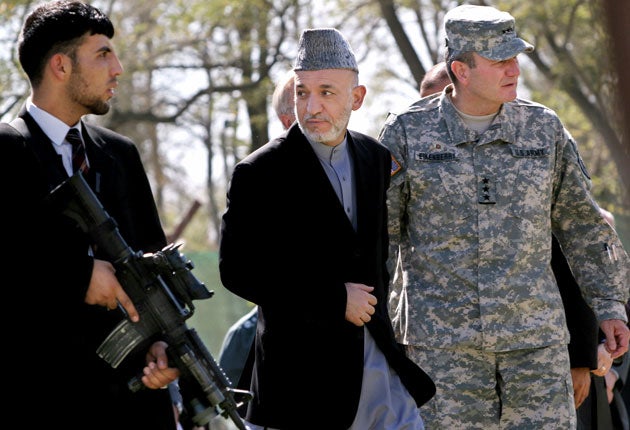US gives Karzai a rare dressing down over 'occupation' rhetoric

Straying beyond the normal boundaries of diplomatic nicety, the American Ambassador to Afghanistan, Karl Eikenberry, delivered a sharp verbal slap to President Hamid Karzai yesterday for his criticism of Nato's operations in his country implying that the US was becoming weary of it.
While Mr Eikenberry, who was delivering an address at Herat University, did not mention Mr Karzai by name, there was no doubting whom he was castigating. His remarks came one day after a speech by Mr Karzai in which he said the Nato countries were in his country "for their own purposes".
"When Americans, who are serving in your country at great cost – in terms of life and treasure – hear themselves compared with occupiers, told that they are only here to advance their own interest, and likened to the brutal enemies of the Afghan people, they are filled with confusion and grow weary of our effort here," said Mr Eikenberry, who is to leave the post later this summer.
"Mothers and fathers of fallen soldiers, spouses of soldiers who have lost arms and legs, children of those who lost their lives in your country – they ask themselves about the meaning of their loved one's sacrifice," he said. "When I hear some of your leaders call us occupiers, I cannot look these mourning parents, spouses and children in the eye and give them a comforting reply."
That Mr Eikenberry would air such grievances in public and with such evident personal passion will be seen as an indicator that relations between Washington and Mr Karzai are becoming dangerously strained. The new rift comes at a delicate moment with President Barack Obama preparing to decide on the details of a drawdown of American troops in Afghanistan that is supposed to start this summer.
On Saturday, Mr Karzai also went further than ever before in acknowledging that efforts are under way to start talks with the Taliban as a first step towards a political settlement. "The foreign military and especially the United States itself is going ahead with these negotiations," he said in his speech.
But the US Defence Secretary, Robert Gates, who retires at the end of this month, used warned at the weekend against building up expectations regarding such contacts. And he advised against any precipitate withdrawal of US troops arguing that keeping the Taliban militarily engaged is the only way to draw them into political talks.
"The Taliban have to feel themselves under military pressure, and begin to believe that they can't win before they're willing to have a serious conversation," he said, adding that it would be months before any "substantive headway" can be made in peace talks.
So close to stepping down from a job in which he has spanned the administrations of Mr Obama and former president George Bush, the Defense Secretary is using his last days in office to articulate some of his broader views on America's role in the world. In an interview with The New York Times, he suggested his experience in office had led him to be more wary about excercising American military power.
"If we were about to be attacked or had been attacked or something happened that threatened a vital US national interest, I would be the first in line to say, 'Let's go.' I will always be an advocate in terms of wars of necessity," Mr Gates said. "I am just much more cautious on wars of choice."
Mr Karzai's criticisms of Nato are not new but seem in recent weeks to have taken a more ferocious tone. In particular, the Afghan leader has berated the alliance for killing civilians and for conducting nighttime raids which he has opposed. But it was his comment on Saturday about Nato members being self-serving that seems to have triggered the indignation of Mr Eikenberry.
"They're here for their own purposes, for their own goals, and they're using our soil for that," Mr Karzai said.
Join our commenting forum
Join thought-provoking conversations, follow other Independent readers and see their replies
Comments
Bookmark popover
Removed from bookmarks